#hunted by the narrative
Text
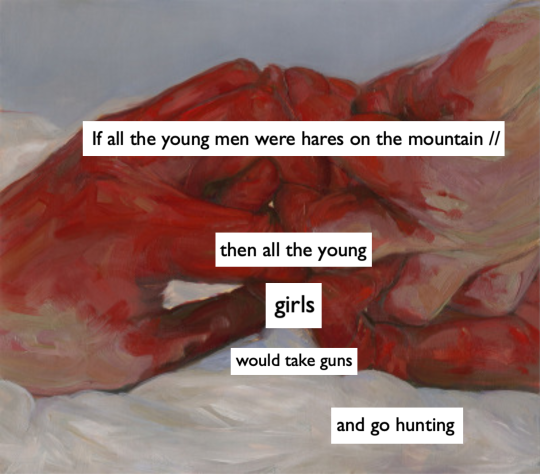
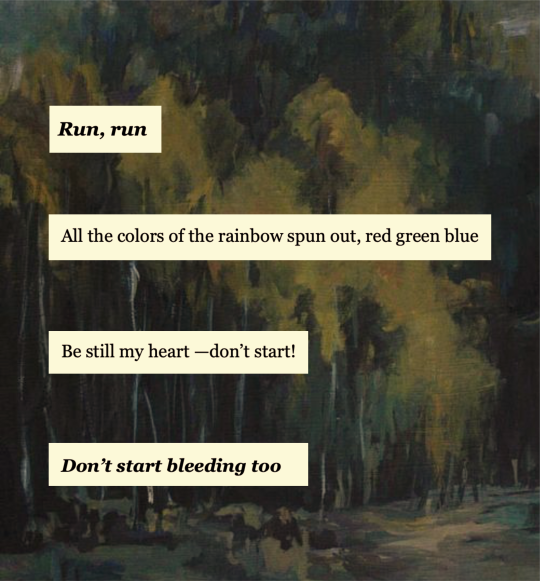
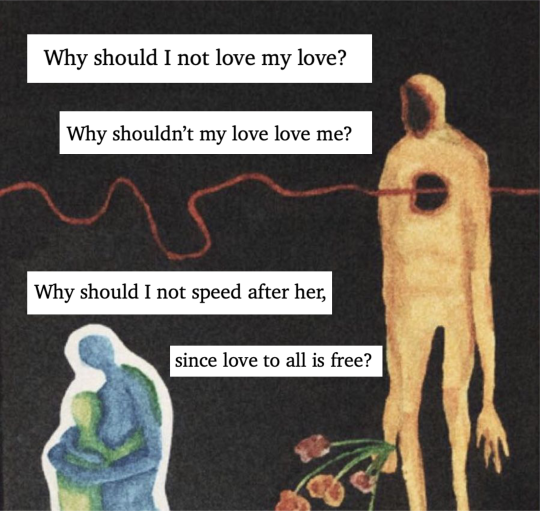
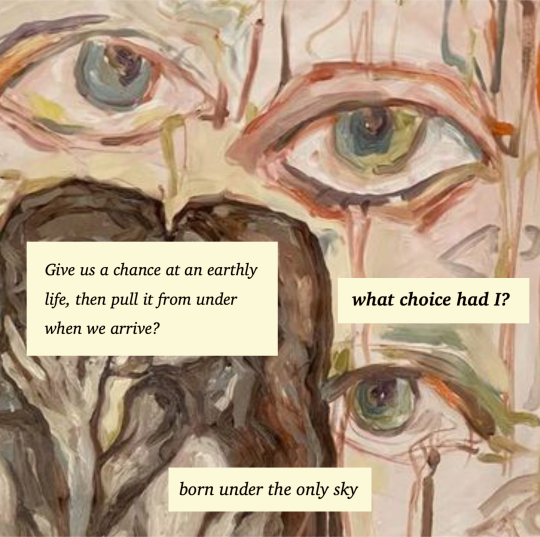



hunted by the narrative
hares on the mountain, traditional folk song // art by jen mazza
sparrow for a heart, abigal lappell // art by barbara bokoto-tomala
newcastle, traditional folk song // artist unknown
if i was a painter, lisa o'neill // art by claudia barbu
ashamed, deer tick // art by nicolas samori
i wish my baby was born, traditional folk song // artist unknown
hard wired, shakey graves // art by miles johnston
#so this is my contribution to the hunger games renaissance#i reread the books and BOY am i angsty about it#given that its trending i might as well tag it#but feel free to blorbo tag at your leisure!#hunted by the narrative#my edits#the hunger games#thg#katniss everdeen x peeta mellark#katniss x peeta#everlark
645 notes
·
View notes
Text
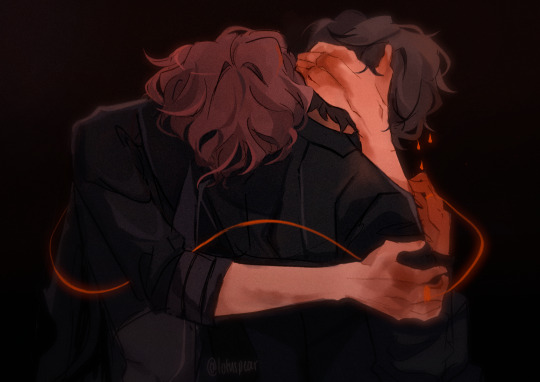
intertwined fate
#oughh...............skk when doomed by the narrative.................''your bloodied hand in mine.''#''we may be villains to the world but to each other we're two halves of one soul''#the appaling lack of skk angst on my blog recently came to my attention. i needed to fix that so i drew this#p sure there's symbolism for this but i'm not good at correlating things so skk stans you guys can have a shot at it#if any of my genshin followers @ me in the comments for the caption i will hunt you down /threat#bungou stray dogs#bungo stray dogs#bsd#dazai osamu#osamu dazai#nakahara chuuya#chuuya nakahara#soukoku#skk#lotus draws
5K notes
·
View notes
Text
i’ve never been as angry on behalf of a character as i am for sam winchester
#currently thinking about season four and five. absolutely fuckibg mental#the world literally reshapes itself around him to prove him wrong#its all framed as God. Sam was so stupid and selfish and reckless for drinking demon blood. He just liked the power of it and he chose a#DEMON over DEAN.#but. that’s not the story they tell in s4.#like even aside from every single other complexity. Sam is literally right. he has ZERO WAY of knowing that killing lilith is the final seal#AND DEAN DOESNT KNOW TJAT EITHER. like sam is literally right he can kill lilith and he does kill lilith. dean wants lilith dead just as#much. sam’s cardinal sin is disobeying dean and then the world flips around on him and plot twist sam and dean were both wrong all along and#killing lilith is what will bring back lucifer :)#but. it’s not framed like that either. it’s framed like SAM BROUGHT BACK LUCIFER BY KILLING LILITH WHILE HIGH ON DEMON BLOOD#dean you wanted to kill lilith too?????????#but. doesn’t matter dean despite being mostly motivated by jealous anger is retroactively proven to be Right#and sam is retroactively proven to be Wrong. he is bad#i just. jesus. sam’s not evil ever. he’s hardly even that fucking morally grey#and he still thinks there’s something wrong with him that he’s a freak that he’s inherently evil and needs to be purified#why?? cause of something fucked up that happened to him when he was a baby#and because he’s disobeyed his father and his brother and been angry at awful things that have happened to him#makes me feel fucking insane actually#no wonder narrative frames sam as evil no wonder he’s inherently marked as Bad by the forces in supernatural like even on a meta level#in supernatural gods just another shitty father. embodiment of the familial patriarch. and from sam’s very first moment on the show he’s in#opposition to that he’s ran away from john and he argues with dean. therefore he is evil#i don’t think my words r really making sense right now but. fucking hell#and sam is so swamped in guilt all of season five and he just fucking accepts that everything bad is his fault#and he gets tortured in the cage to save the fucking world and it’s STILL not enough. not to appease his own guilt and not to appease deans#anger at him. dean is still throwing his perceived violations back at him in like season nine!!#and whenever he tries to get out it’s treated as yet another Sin. narrative acts like sam thinking dean was dead and having a life outside#of hunting is The Worst Thing He Ever Did#worst sin sam ever commits in the eyes of the show is disobedience. Absolutely awful actually#spn#sam winchester
112 notes
·
View notes
Text
SAPNAP: I genuinely respect you. May the best man win.
SHADOUNE: I’m glad you’re here at the final with me.
-
SHADOUNE: Sapnap! We fought, together-
SAPNAP: -we die together!
#sapnap and shadoune are like. what if I hated you because you and your team took everything from me#but at the end of the world I know you are me and I am you and yet there must be only one of us#narrative foils I love you forever#Sapnap#shadoune#hunt and run#squid craft 2
188 notes
·
View notes
Text
"aang didn't tell katara to forgive just to let her anger out and let go" ?!?!?!?! litcheraclly the WHOLE false dichotomy presented by the narrative of the episode (using AANG as the primary mouthpiece) is forgiveness vs revenge like please watch the episode again and pay actual attention to the words coming out of aang's mouth.... so many tsr takes ignore the words in aang's mouth to interpret him more positively while putting words in zuko's mouth to view him more negatively, all the while pretending katara never said anything at all about HER OWN TRAUMA
#tsr actually manages to achieve some really profound nuance despite the limitations of the simplistic moral narrative its partly pushing#and yet the takes are SO fucking rancid my fucking beloathed forever#holly talks bs#aang critical#katara#zuko#i fully believe that if aang hadn't known or said shit about k and z hunting down yon rha she would've made the exact same choice#to not kill out of mercy but not forgive out of justice#because its not aang or even zuko that knows katara best#but katara that knows herself best#she did not almost lose herself in tsr#she FOUND herself#and to quote zuko#she did it on her own
139 notes
·
View notes
Text
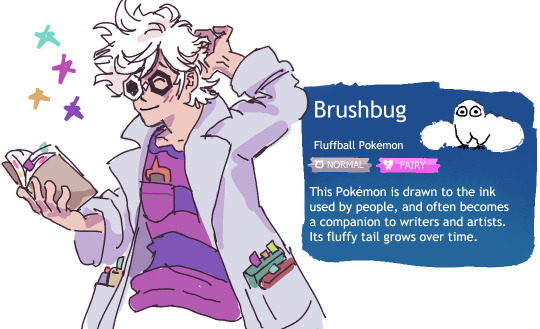
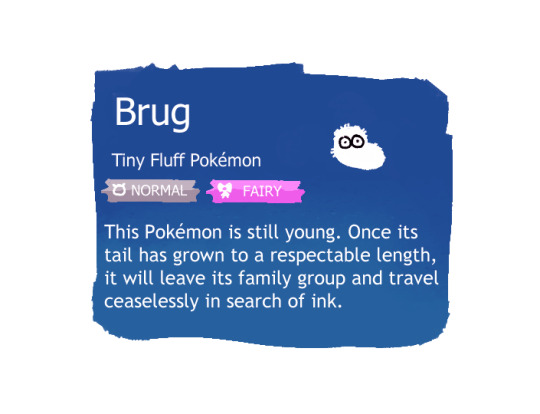
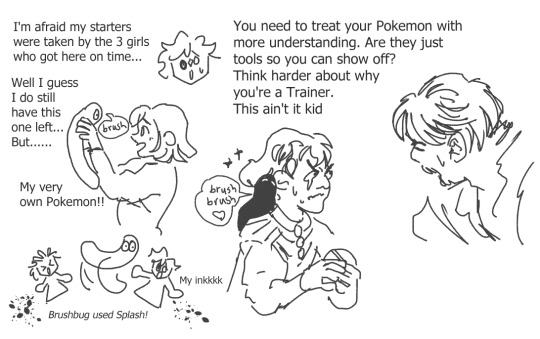
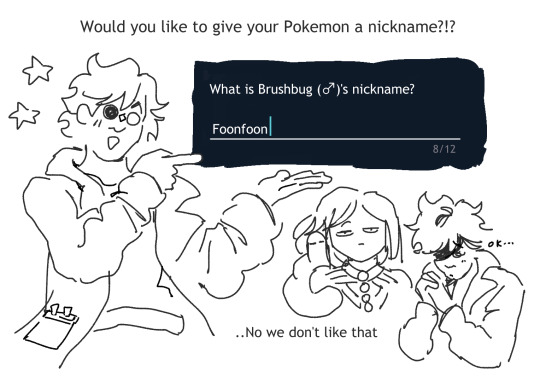
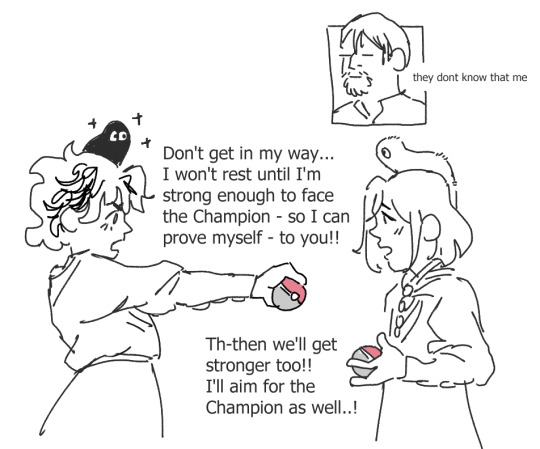
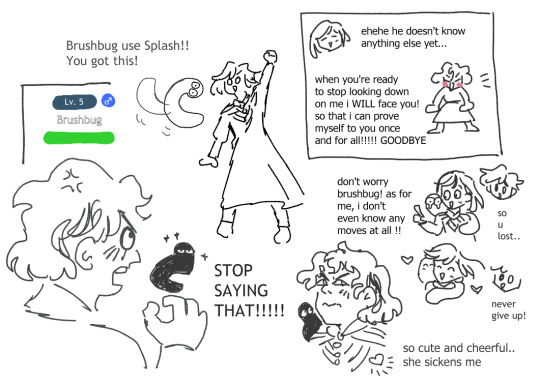
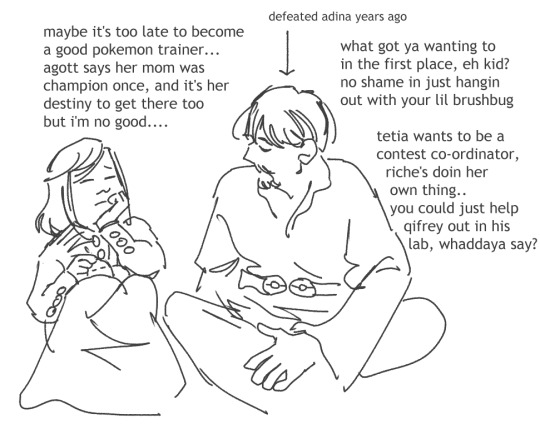
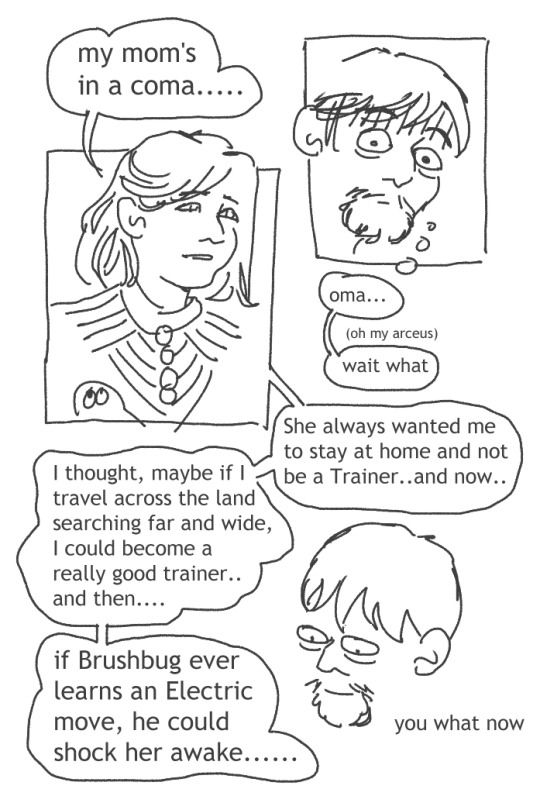
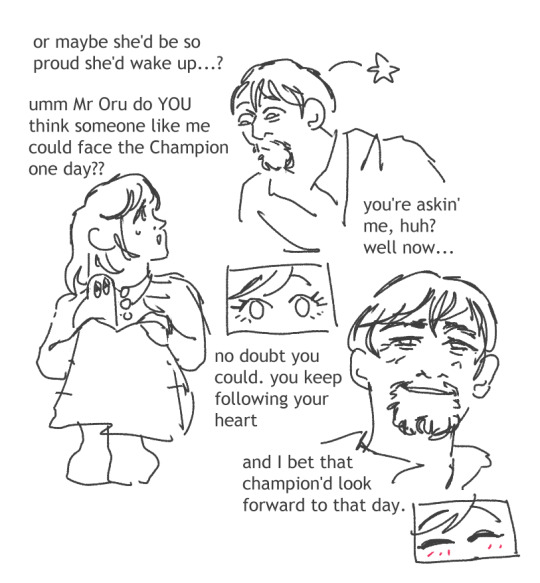
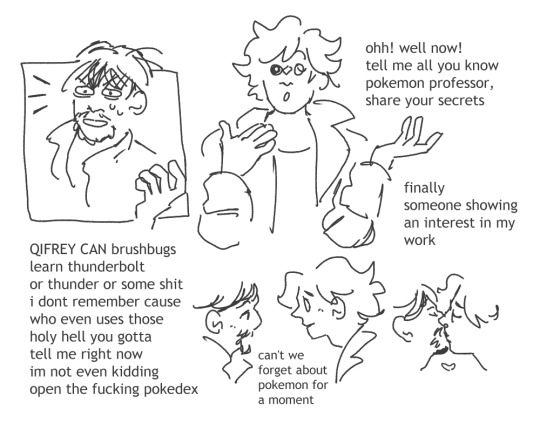
shirahama-sensei reminded me she has a thing for the teacher from pokemon s/v so i randomly went off on an au where qifrey is the professor. etc
#witch hat tag#orufrey#the first image is qifrey dressed as that guy. i'm glad she has an inexplicable attachment to some dorky pokemon man like i do#someone was like 'wouldn't it make more sense for deanreldea to be the champion' .... well no. not in my world .#it maps onto magic skill. champions aren't like the Rulers of the land they're just the most skilled at this thing#oru as a burnt out champion who's gently encouraging a kid like coco to reach him one day means a lot to me. i like pokemon narratives#agott went shiny hunting for the same thing coco had but cooler - just to impress her. she really is a pokemon rival type girl#pushing myself to the limit to prove my worth to you - to get to the summit first so i'm waiting for you..#and then realising it wasn't just to be strong - i realised i started wanting to see your smile. i wanted you to have fun.#i think coco would defeat agott at the end of victory road and then defeat oru & i'll probably draw one last thing abt that at least..#the image is very cinematic..the dialogue and music in my mind..I WANT TO FACE ORU!!!!!!!!!!#the super cool insanely powerful awesome champion is the spouse of my professor and he gave me advice at the beginning...no way....#btw the elite four would be the sages which is perfect (and maybe easthies as the first guy?) evil Team Brimhats#coustas as their renegade gladion-type figure. the gym leaders would be like sun/moon and s/v combined#travelling around facing the best students from different classes - so jujy and eunie etc.#i've barely thought about 'teams' or anything bc i care amore about the narrative side of things always lol#but idk. tetia with a swirlix - eunie would be ghost type boy - riche with small things but also a ceruledge or a steelix something massiv#and brushbug would have a final form which is really long like an eastern dragon- fluffy and with wings like a fairy. It's beautiful to me#well anyway *tries to move on to the rest of life now the brief obsession has passed*#obviously oru would be fire-type tho and qifrey would be water-type and they set off together and traded their starters etc.....it goes on
145 notes
·
View notes
Text

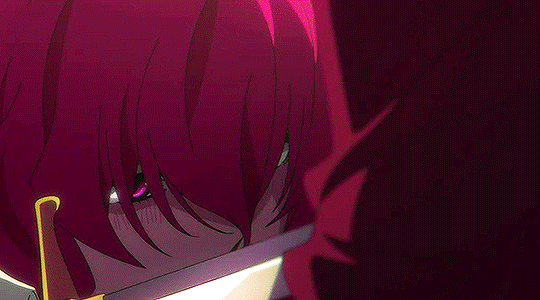
i chose by my own will to stand next to the captain, yet all you can say to change my mind is "justice"?
#bungou stray dogs#hyeahbsd#bsdedit#bsd teruko#bsd hunting dogs#teruko#gifs: eri#post: eri#if you saw my post last night pls dont mention it hopefully these do not get fucked up in quality#fave fave narrative moment in finale for me i almost cried watching
307 notes
·
View notes
Note
so based on the 'dmk poking mir falspar' comic there, can falspar actually Feel through those pauldrons around the cracks at all or did he just notice dmk prodding him through the contact the armor has with his arm and that was enough to set him off? It certainly seemed to hurt him when he put on a new pauldron that one time and it shattered, could he actually feel it break or was he reacting to something else? Loving the comics as always btw being so normal about these funny little guys and their funny little problems~
Oho, an interesting question!
Mostly, he's reacting to the noise. Reflections who have shattered before tend to be more sensitive to the sound of something breaking, particularly mirror-adjacent material, like glass, and thats only more unsettling when it appears to be coming directly from you.

Mir Falspar can't feel his armor breaking, but he can feel when his shoulder itself is getting worse, which usually results in more extreme breakage in whatever is connected to it—which in-turn stresses him out even further, and can occasionally lead to a feedback-like loop where he's stuck there, gripping his arm, trying to ride it out. (Comicwise, Mir Falspar noticed his pauldron was nudged and flinched away as soon as he saw it was DMK who was prodding.) No one has really witnessed the full extent of this, as Mir Falspar will hide himself away the moment he suspects he's going to seize up, and if he truly can't escape in a situation, then he will grit his teeth and force his way through it as if nothing is wrong, blazing denial until the end.
And at last, for some inside knowledge (things Mir Falspar won't admit aloud), when his shoulder starts acting up, he begins losing the sensation in his left arm. It's harder to grip things in that hand and it could become a liability in a fight for either being a) unable to strike/guard with like he normally would, or b) too numb for Mir Falspar to tell how much strength he's putting into it, resulting in causing much less or much worse damage than he intended. It looks painful, and can be, but usually stays in line with a feeling of intense pins and needles.

(the kind where it's almost a little too hard to breath, though)
#post's rambles#post's doodle bin#mir falspar#mir dragato#haha glad you're liking the comic insanity!#here's a small one. as a treat#one of these days I'll get around to drawing the times when mir falspar isn't being hunted for sport by the narrative
146 notes
·
View notes
Text



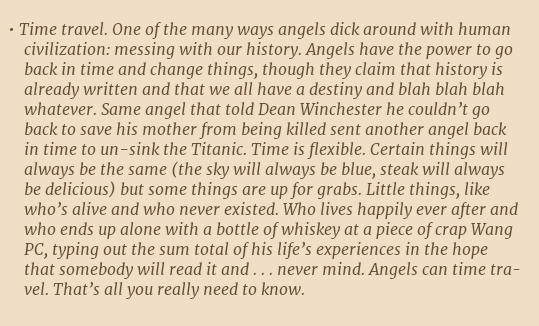

some angel lore stuff from Supernatural: Bobby Singer's Guide to Hunting that's of personal interest to me.
Just highlighting this line in particular about how free will is a very human thing:
"But they didn't count on Dean and Sam showing some backbone and saying no. That may be their fatal flaw--angels rely on humans to go along with their plans, but humans have that which angels lack...free will."
note: Humans have always had free will. angels seem to lack it. Cas wasn't the first being to "invent" free will, but he was, perhaps, the first angel to act on it in a way that altered the course of god's narrative. And that's still BIG. He is one of the first angels to successfully break ranks and "show some backbone" by saying "No" to heaven and god's plan.
#angel lore#i know it's fun to say cas invented free will. but he really didn't. dean was saying fuck destiny since s1.#but cas' actions as an ANGEL are still so important. i think he 'invented' free will for angels#in that he was he first to use it to explicitly change god's narrative and in doing so show other angels that they indeed have a choice#bobby's guide to hunting
141 notes
·
View notes
Text
jrwi riptide 115
So the elephant in the room. Grandberry traitor. It’s Caspian or John right? Those are the two we know, the two we are attached to, it’s not just gonna be random new recruit #7 out of the unnamed folks they’ve picked up. It’s not that one healer from Joaldo who joined them that I can’t remember his name right now.
John has made it clear since he revolted from the Navy that he’s kept up with the Grandberry pirates, that all he wants is to join them. That could be a flag. The fact that he was part of his own “special unit” or something along those lines before going outlaw. There’s the journal of his they found back at Zero that they never truly read through and tossed after reading the first poem, which might have had definite answers. And this is small, but he was really protective over keeping the pin from Jayson Ferin.
But the block throws a wrench in it, because why would they throw him in their highest security prison and let him freeze? Unless somehow John was sure without a shadow of a doubt they would have come back for him, and they weighed the risk and reward. The Ferin family drama could have thrown a wrench in their plans enough to have thrown away any plans on easier escape. It’s plausible, but it just is too much of a discrepancy. And John wears his heart on his sleeve, since episode zero he has, it’s hard to think of him as the traitor.
Then there’s Caspian, who has been with Lizzie since almost the beginning, from Shadowbeard’s crew. It’s where they met, and they both survived and escaped Shatter Skull massacre together. But that means he was there for the fall of Shadowbeard, and Ava Ferin’s death. And while it’s pretty much said by Lizzie she thinks it’s Ava who betrayed her, with everything else said, and with what Jay remembers and loves of her sister, it just doesn’t quite track. There was an ulterior motive to kill Ava in the same fight, ordered by someone higher up, playing into the propaganda and fear mongering against pirates and pro Raft agenda. And he knows Edyn Tidestrider, he was the one to reunite her and Gillion. He has her number. And she is gills deep in double-triple agent Raft bullshit.
But could he have been such a double agent all this time, since Shatter Skull? After all his blood sweat and tears, all the weight he’s lifted for Lizzie? All the Edyn stuff could easily be a coincidence, considering their Undersea connection. And he’s not quite heart on his sleeve honest as John has been, but he’s chill like that, he’s kindhearted and patient. And after everything, and I mean everything, he’s done - for Gillion especially - giving him his sword, reuniting him with his sister, daily phone calls, teaching him spells and moves, being the first friend especially from the undersea and reconnecting him with their culture - it’s so hard to think of him as the traitor.
There’s proof enough for both of them. But everything considered, with how undercover and long term the black book missions are, how even Jay had been a spy at one point - Caspian makes the most sense, doesn’t he.
#if it really is him I’m opening a real life hole in the real life sea and diving in headfirst#I’m just so miserable dude#caspian my favorite my light of my life this whole time I’ve been like man I miss caspian calls I miss caspian time#and John :( he’s just so good. too good. it really could be him to and that sucks so bad#but I’d rather him than caspian jfjskfkskfk after everything. like#he’s always over the top and cheery and hunting for the grandberry pirates. but caspian evidence is damning to me#anyways. I don’t know what to do now#caspian could be a traitor drey is fucking missing why are my faves always doomed by the narrative#jrwi#jrwi riptide#jrwi 115#jrwi riptide 115#jrwi spoilers#riptide spoilers#jrwi caspian#marshal john#z speaks
103 notes
·
View notes
Text

Uhhhhh *starts playing Silver Springs*
#SHANNON DIAZ YOU WILL ALWAYS HUNT THE NARRATIVE TILL SOMEONE ACKNOWLEDGES YOU IN ALL OF YOUR COMPLEXITIES#shannon diaz haunts me personally#i could write a desertation on their relationship#eddie diaz#shannon diaz you will always be famous#art#artistic#artists on tumblr#artwork#fan art#911 abc#911 fandom#shannon diaz#911 fanart
26 notes
·
View notes
Text
And on the unrelated note the doctor was offering cheese toasties and the only thing I could think of was Ianto Jones because it was the last thing he ate with his girlfriend
#it might be so unrelated but that was the only thing I could think of he is hunting the doctor's narrative just like rose#dead friends dead lovers#ianto jones#torchwood#doctor who
20 notes
·
View notes
Text
i've shared some of Alex Freed's narrative writing advice before and i recently read another article on his website that i really liked. particularly in branching/choice-based games, a lot of people often bring up the idea of the author "punishing" the player for certain choices. i agree that this is a thing that happens, but i disagree that it's always a bad thing. i think Freed makes a good case for it here.
...acting as the player’s judge (and jury, and executioner) is in some respects the primary job of a game’s developers. Moreover, surely all art emerges from the artist’s own experiences and worldview to convey a particular set of ideas. How does all that square with avoiding being judgmental?
[...]
Let’s first dispel–briefly–the idea that any game can avoid espousing a particular worldview or moral philosophy. Say we’re developing an open world action-adventure game set in a modern-day city. The player is able to engage any non-player character in combat at any time, and now we’re forced to determine what should occur if the player kills a civilian somewhere isolated and out of sight.
Most games either:
allow this heinous act and let the player character depart without further consequence, relying on the player’s own conscience to determine the morality of the situation.
immediately send police officers after the player character, despite the lack of any in-world way for the police to be aware of the crime.
But of course neither of these results is in any way realistic. The problems in the latter example are obvious, but no less substantial than in the former case where one must wonder:
Why don’t the police investigate the murder at a later date and track down the player then?
Why doesn’t the neighborhood change, knowing there’s a vicious murderer around who’s never been caught? Why aren’t there candlelight vigils and impromptu memorials?
Why doesn’t the victim’s son grow up to become Batman?
We construct our game worlds in a way that suits the genre and moral dimensions of the story we want to tell. There’s no right answer here, but the consequences we build into a game are inherently a judgment on the player’s actions. Attempting to simulate “reality” will always fail–we must instead build a caricature of truth that suggests a broader, more realized world. Declaring “in a modern city, murderous predators can escape any and all consequences” is as bold a statement on civilization and humanity as deciding “in the long run, vengeance and justice will always be served up by the victims of crime (metaphorically by means of a bat-costumed hero).”
Knowing that, what’s the world we want to build? What are the themes and moral compass points we use to align our game?
This is a relatively easy task when working with a licensed intellectual property. In Star Trek, we know that creativity, diplomacy, and compassion are privileged above all else, and that greed and prejudice always lead to a bad end. A Star Trek story in which the protagonist freely lies, cheats, and steals without any comeuppance probably stopped being a Star Trek story somewhere along the line. Game of Thrones, on the other hand, takes a more laissez-faire approach to personal morality while emphasizing the large-scale harm done by men and women who strive for power. (No one comes away from watching Game of Thrones believing that the titular “game” is a reasonable way to run a country.)
These core ideals should affect more than your game’s storytelling–they should dovetail with your gameplay loops and systems, as well. A Star Trek farming simulator might be a fun game, but using the franchise’s key ideals to guide narrative and mechanical choices probably won’t be useful. (“Maybe we reward the player for reaching an accord with the corn?”)
Know what principles drive your game world. You’re going to need that knowledge for everything that’s coming.
[...]
Teaching the player the thematic basics of your world shouldn’t be overly difficult–low-stakes choices, examples of your world and character arcs in a microcosm, gentle words of wisdom, obviously bad advice, and so forth can all help guide the player’s expectations. You can introduce theme in a game the way you would in any medium, so we won’t dwell on that here.
You can, of course, spend a great deal of time exploring the nuances of the moral philosophy of your game world across the course of the whole game. You’ll probably want to. So why is it so important to give the player the right idea from the start?
Because you need the player to buy into the kind of story that you’re telling. To some degree, this is true even in traditional, linear narratives: if I walk into a theater expecting the romcom stylings of The Taming of the Shrew and get Romeo and Juliet instead, I’m not going to be delighted by having my expectations subverted; I’m just going to be irritated.
When you give a player a measure of control over the narrative, the player’s expectations for a certain type of story become even stronger. We’ll discuss this more in the next two points, but don’t allow your player to shoot first and ask questions later in the aforementioned Star Trek game while naively expecting the story to applaud her rogue-ish cowboy ways. Interactive narrative is a collaborative process, and the player needs to be able to make an informed decision when she chooses to drive the story in a given direction. This is the pact between player and developer: “You show me how your world works, and I’ll invest myself in it to the best of my understanding.”
[...]
In order to determine the results of any given choice, you (that is, the game you’ve designed) must judge the actor according to the dictates (intended or implicit) of the game world and story. If you’re building a game inspired by 1940s comic book Crime Does Not Pay, then in your game world, crime should probably not pay.
But if you’ve set the player’s expectations correctly and made all paths narratively satisfying, then there can be no bad choices on the part of the player–only bad choices on the part of the player character which the player has decided to explore. The player is no more complicit in the (nonexistent) crimes of the player character than an author is complicit in the crimes of her characters. Therefore, there is no reason to attempt to punish or shame the player for “bad” decisions–the player made those decisions to explore the consequences with you, the designer. (Punishing the player character is just dandy, so long as it’s an engaging experience.)
[...]
It’s okay to explore difficult themes without offering up a “correct” answer. It’s okay to let players try out deeds and consequences and decide for themselves what it all means. But don’t forget that the game is rigged. [...]
Intentionally or not, a game judges and a game teaches. It shows, through a multiplicity of possibilities, what might happen if the player does X or Y, and the player learns the unseen rules that underlie your world. Embracing the didactic elements of your work doesn’t mean slapping the player’s wrist every time she’s wrong–it means building a game where the player can play and learn and experiment within the boundaries of the lesson.
#every choice you make while designing your game says something about your experiences and your world view#whether you think it does or not#i think abt that interview with hozier where he talks abt all art being political & someone in the comments tried to disagree#by saying a child's drawing of their house cant possibly be political & someone else replies:#but it is. what does a house look like to them? is it one story or two? is it a trailer? an apartment? these things imply something#about that child's lived experience#another post i reblogged on kithj that talked abt these games like the forest or far cry where you play as a random white guy#that is being hunted by the evil native people. and the game requires you to just indiscriminately kill them#without thinking about it bc it's a game and you're the protag. that says something whether it was intentional or not#allowing the player character to do or say certain things without consequences communicates something to the player!!!#this does not mean you should punish them but that you should think about your narrative design and your choices and their outcomes#think about what makes sense in your world#and think about what it could imply in the real world. to the player#and think about all the different paths you can explore with them in this way#writing
70 notes
·
View notes
Text
“I’ve betrayed Lane’s trust too many times”
“And each time you did so of your own volition”
Ilsa and Atlee have this conversation in Rogue Nation and I think it epitomizes her character quite succinctly. Because she will always go her own way, in spite of the consequences against herself and the people around her. She’s both forced into these corners by the men around her and forced to take ownership of the actions she takes to get herself out of them.
What’s interesting in dead reckoning part one is that Kittridge places the onus on Ilsa with regard to her involvement with the entity/the key. He effectively absolves Ethan of personal responsibility with regard to Ilsa’s well-being. He points out to Ethan of the established pattern of behavior that Atlee comments on back during rogue nation.
And while Ethan personally disagrees, the narrative up until this point has been clear in reinforcing that Ilsa should be the only one responsible for the actions she takes. And while the rest of the team are saddened and feel helpless by her death, narratively speaking, it is a choice she makes knowing the outcome and accepting her fate. something she’s run away from in the last two movies.
#ethan hunt#mission impossible#ilsa faust#mission: impossible#Ethan and Ilsa two people fighting against the narrative but in differnt directions
27 notes
·
View notes
Text
Wait I just saw someone on twt say Mia should have been the RE8 protagonist bc of the themes of motherhood and how she’d contrast to Lady D and Mother Miranda and now I feel so robbed
#I love Ethan that’s my little guy but come on#mia hunting for her daughter would have made such a story#the NARRATIVE
26 notes
·
View notes
Text
y'all i mean this w love but mha from the start has been a story examining how villains are also victims of the circumstances their world has imposed on them. why would afo be any different
#bnha spoilers#407 is from AFO'S POV#“he must intrinsically be evil” isn't something the narrative is saying but something THAT HE DEEPLY BELIEVES#his birth killed his mother and weakened his brother and there are people who are hunting them down#his method of empathizing w the world is through the lens of fiction#all these things that are happening to him are bad; therefore he MUST be the villain#if there are roles for him to play then that must be where he fits#this was done for dabi and shiggy and toga#& i love that thematically he is no different from them#i also love the unreliable narrator and the fucked up relationship between him and yoichi#yes yoichi is taken cared of. yes afo abuses him and is possessive of him#idk its just that afo dehumanizes everyone INCLUDING HIMSELF#407 spoilers#bnha 407#and NO this doesn't excuse what he's done! no villain backstory justifies what they do!#it just EXPLAINS them from their POV
57 notes
·
View notes